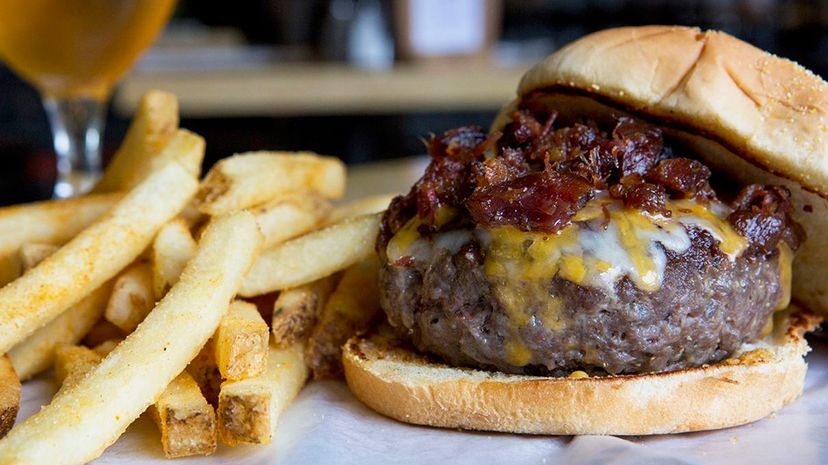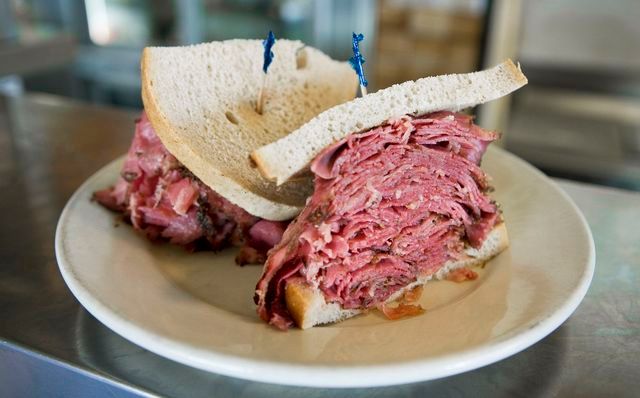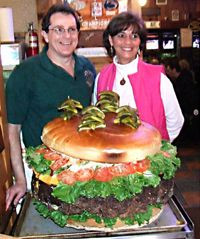
Before you take a bite of that juicy cheeseburger on your plate, here's something that may take away a little of your appetite. Production of the meat burns up a lot of natural resources. According to the Center for a Livable Future at Johns Hopkins University, for example, it took as much as 625 gallons (2,366 liters) of water to produce that quarter-pounder you're about to eat, when you take into account not just the water that cattle drink, but the irrigation required to produce the grain and grasses that they ate. Research by Dutch scientists, in fact, shows that raising farm animals accounts for 27 percent of the world's freshwater consumption.
"Other than the ethical, animal-welfare reasons for choosing a vegan diet, the environmental issues are arguably equally as strong," says Krissi Vandenberg, executive director of Vegan Action, a Richmond, Virginia-based organization that advocates a diet free of animal products. "Land used to feed animals instead of growing food directly for humans is unsustainable and wasteful. Thousands of acres of land are being degraded — through erosion, compaction, desertification, and nutrient loss — from grazing cattle." For more on that, here's a 2006 U.N. World Food Organization report on the environmental impacts of meat.
Advertisement
And here's something else that you may not know. Even if you're an omnivore — a person who eats both meat and plant-based foods such as fruit, vegetables and grains — and not a meatatarian who shuns any dish that's not 100 percent flesh, you may be consuming nearly as much or even more plant-based food than your vegetarian neighbor dining on kale and teriyaki tofu. When you factor in the amount that the cow ate before it became your burger, omnivores consume more plant-based food than vegetarians.
The study "Patterns of food consumption among vegetarians and non-vegetarians," published in the Journal of Nutrition in 2014, surveyed 89,000 members of the Seventh-Day Adventist Church in the U.S. and Canada to gather data on various dietary preferences. The subjects ranged from people who ate meat, eggs and dairy products to hardcore vegans, who avoid any food that comes from an animal. (In between, there are lacto-ovo vegetarians, who consume dairy products and eat eggs, pesco-vegetarians who eat fish but no red meat or poultry, and semi-vegetarians who indulge in meat occasionally.)
The researchers found that vegans, on average ate 1,658.5 grams (58.5 ounces) of plant-based foods — fruits, vegetables, avocados, potatoes, grains, legumes, soy, nuts and seeds — each day. Lacto-ovo vegetarians ate 1,336.5 grams (47.1 ounces) and pesco-vegetarians ate 1424.1 grams (50.2 ounces). Meat-eaters, in comparison, ate 1,108.7 grams (39.1 ounces) of plant-based foods — not as much on its own as the vegetarians, but a substantial amount.
However, the meat-eaters in the study also ate 59.2 grams (2 ounces) of meat a day. Seventh-Day Adventists tend to be health-conscious, so that's actually a lot lower than the national meat-eating average of 226.8 grams (8 ounces), based on U.S. Department of Agriculture data. But let's assume the smaller amount.
Now, let's consider the amount of grain and grasses consumed by the animals that end up as meat on your plate. This gets a little trickier to calculate, because different meat animals consume different amounts of plant-based food, according to this 2013 Economist article.

Marion Nestle, the Paulette Goddard Professor in the Department of Nutrition, Food Studies, and Public Health at New York University and author of "Food Politics," writes via email that all in all, "the ratio seems to be on the order of 6 pounds of grain to 1 pound of meat."
So if you multiply 59.2 grams (2 ounces) by six and add it to the meat-eater's total consumption, you get 1463.9 grams (51.6 ounces), which is more plant-based food than most vegetarians, with the exception of vegans. But again, remember that's using an example at the low end of meat-eating. If you use an individual American at the USDA's daily average of 8 ounces of meat consumption, the total soars to 2,529.5 grams (89.2 ounces) of plant-based food. That's way more than even vegans consume — about 52 percent more.
Why is this significant? The amount of plant-based food that meat animals consume is mind-boggling — as Nestle points out, roughly 70 percent of corn and soybean production, for example, goes to feed animals. That makes meat production an inefficient way to glean nutrition out of the planet's farmland. A 2013 study by University of Minnesota researchers, published in the journal Environmental Research Letters, concluded that if the farmland needed to produce animal feed were instead used to grow food for human consumption, we could feed an additional 4 billion people worldwide.
Advertisement

